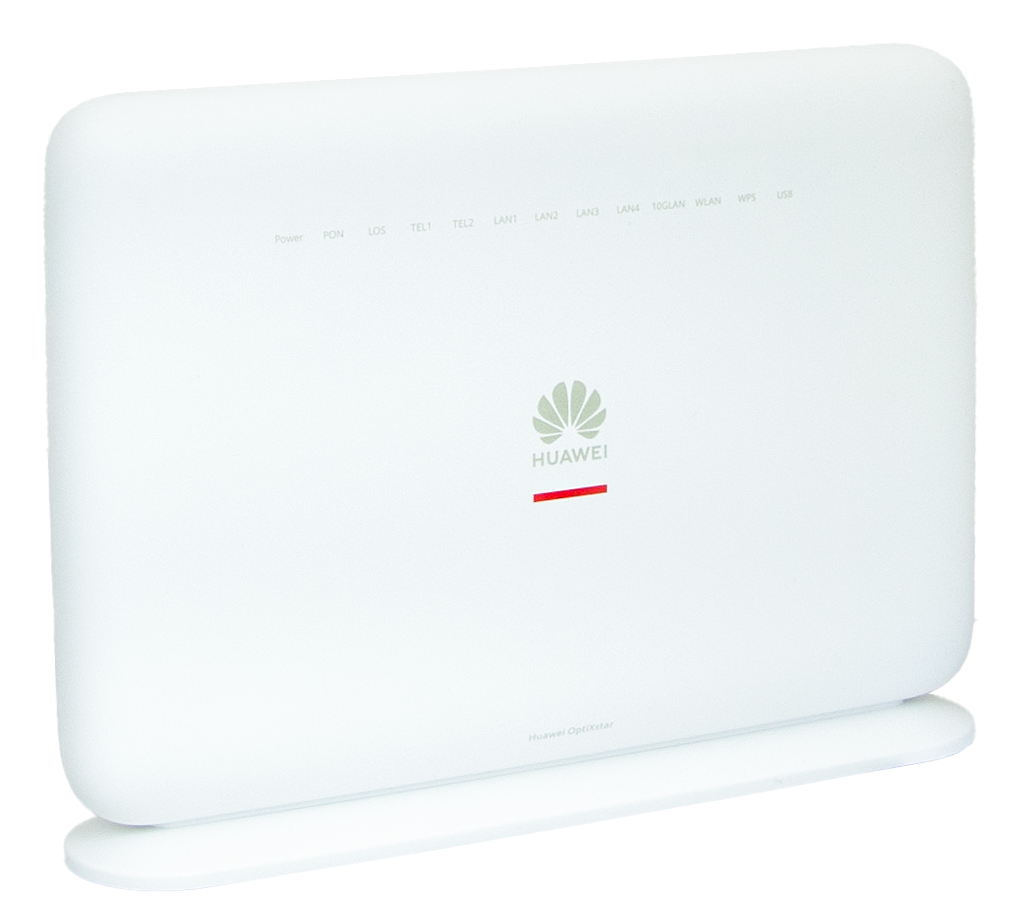-
€
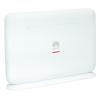
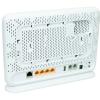
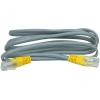
The Huawei EN8255X6s-8X is a client ONU terminal designed for XGS-PON networks. It features one 10G Ethernet port, allowing full utilization of the capabilities offered by this PON standard, and supports speed negotiation (100 / 1000 / 2500 / 5000 / 10000 Mb/s). Additionally, the device includes 4 gigabit Ethernet ports (10/100/1000 Mb/s) and 2 POTS (RJ11) telephone ports. The terminal can transmit wireless networks according to the Wi-Fi 6 standard. It supports IEEE 802.11 b/g/n/ax in the 2.4 GHz band and IEEE 802.11 a/n/ac/ax in the 5 GHz band. With 4 streams (4x4 MIMO), the theoretical maximum Wi-Fi throughput is 1147 Mb/s in 2.4 GHz and 4804 Mb/s in 5 GHz. This is twice the throughput of standard Wi-Fi 6 solutions and significantly higher than older Wi-Fi 5 devices. It enables the creation of a high-performance wireless network and ensures optimal speeds even with many connected users. An additional feature is the USB 2.0 port, which you can use to create an FTP disk or share resources using Samba.

The offered product supports the XGS-PON standard and uses an SC/APC port (Class N1 / N2 / E1) for WAN connectivity. XGS-PON provides symmetrical data transmission with a bandwidth of 10 / 10 Gb/s. This is a key feature distinguishing it from the XG-PON standard, which offers asymmetrical speeds of 10 / 2.5 Gb/s. Compared to GPON, which has a bandwidth of 2.5 / 1.25 Gb/s, XGS-PON also supports a higher maximum split ratio. XGS-PON supports a 1x256 split, while GPON supports only a 1x128 split. This allows you to connect twice as many subscribers per port. Additionally, XGS-PON operates at different wavelengths than XG-PON and GPON, enabling the use of a single optical fiber to support three different transmissions using different standards.
Wi-Fi 6 AX6000
The terminal can simultaneously transmit a Wi-Fi 6 wireless network on both the 2.4 GHz and 5 GHz bands. It uses IEEE 802.11 b/g/n/ax protocols in the 2.4 GHz band and IEEE 802.11 a/n/ac/ax protocols in the 5 GHz band. With 4x4 MIMO technology, the theoretical maximum throughput is 1147 Mb/s in the 2.4 GHz band and 4804 Mb/s in the 5 GHz band. This is twice the speed provided by standard Wi-Fi 6 solutions.
Transmission is handled by built-in omnidirectional antennas with a gain of 2 dBi. Network stability and quality are ensured by features such as Beamforming, BSS Coloring, and Band Steering.

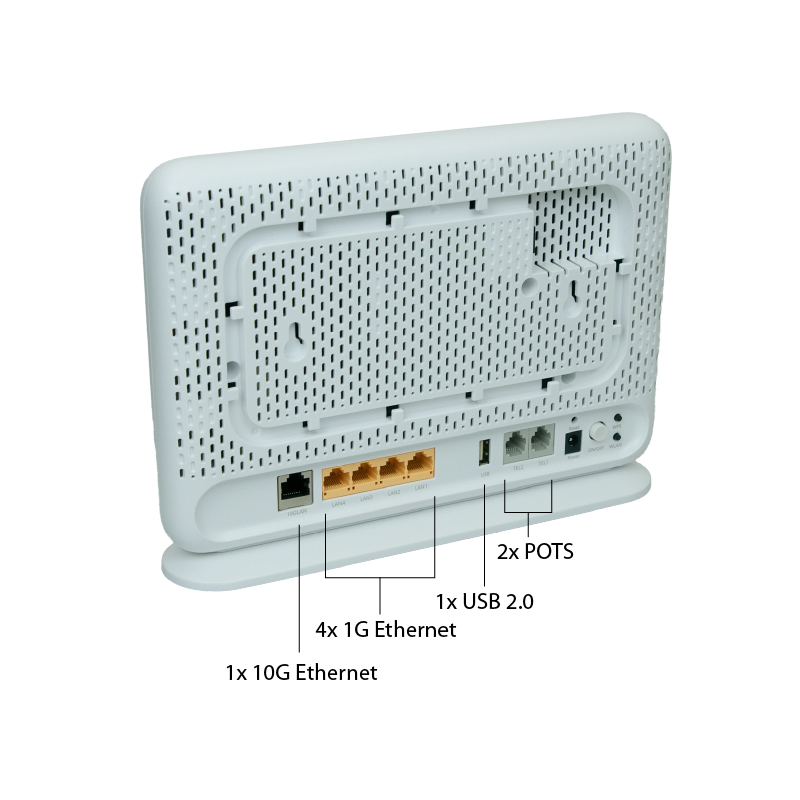
1x 10G Ethernet, 4x 1G Ethernet, 2x POTS, 1x USB 2.0
The device is equipped with 1 10G Ethernet port and 4 1G Ethernet ports. This allows subscribers to utilize data packets with a bandwidth of up to 10 Gb/s. The 10G ports can be used to connect a switch or, alternatively, a key network device such as a server.
The use of 2 POTS telephone ports enables the provision of VoIP services with the option to connect a standard analog phone. An additional advantage is the USB 2.0 port, which allows users to connect external storage devices, such as a USB flash drive. This facilitates quick and convenient file sharing and printer access within the local network.
12 V Power Supply, Wall Mounting Capability
The EG8255X6s-8X features a desktop enclosure with a special stand that allows it to be placed upright. Alternatively, you can opt for wall mounting by using two standard mounting screws. The nominal power supply parameters are 12 V DC and 3 A, with a maximum power consumption of 30 W and a static consumption level of 12.5 W.
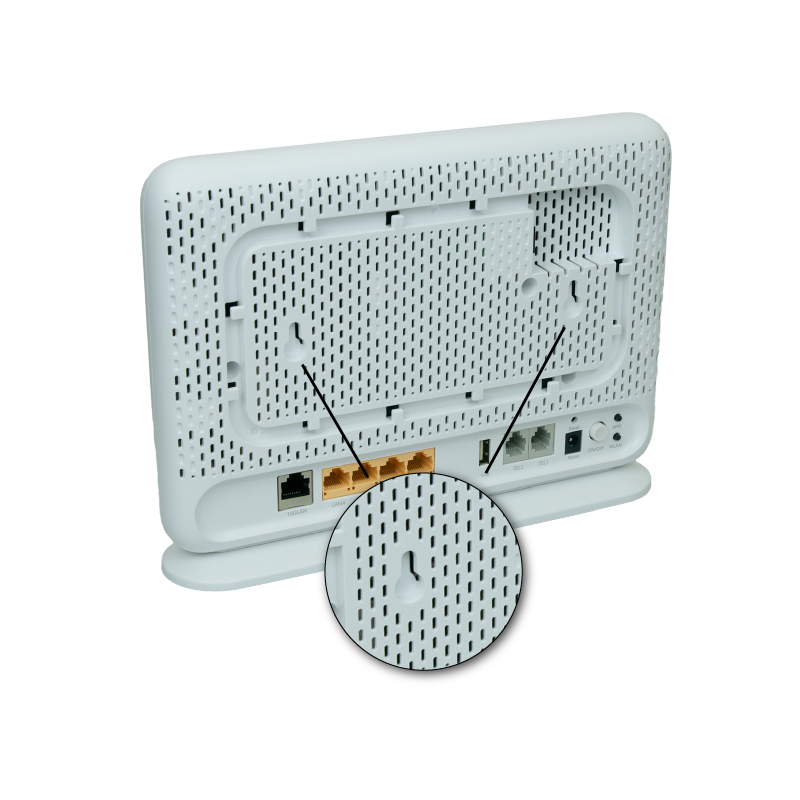

Usage
The Huawei OptiXstar EN8255X6s-8X is an ideal solution for the most demanding subscribers in XGS-PON networks. It allows you to offer very high bandwidth packages of up to 10 Gb/s. The high wireless throughput and the use of a 10G Ethernet interface enable full utilization of such speeds. The terminal stands out for its high performance and will meet the expectations of every subscriber.
Specifications
| Huawei EN8255X6s-8X | |
| General features | |
|---|---|
| Dimensions | 176mm x 250mm x 35mm (excluding base) 186mm x 250mm x 52mm (including base) |
| Weight | 705 g |
| Operating temperature | 0°C to 40°C |
| Operating humidity | 5% RH to 95% RH (noncondensing) |
| Power adapter input | 100 - 240 V AC, 50/60 Hz |
| System power supply | 12 V DC, 3 A |
| Static power consumption | 12,5 W |
| Maximum power consumption |
30 W |
| NNI (WAN interface) | XGS-PON |
| UNI (LAN interface) |
1x 10G Ethernet 4x 1G Ethernet 2x POTS (RJ11) 1x USB 2.0 WLAN Wi-Fi 6 (2,4 & 5 GHz) |
| Optical connector | SC/APC |
| Indicators | Power / PON / LOS / TEL1 / TEL2 / LAN1-4 / 10GLAN / WLAN / WPS / USB |
| Memory |
256 MB Flash 512 MB RAM |
| Interface parameters | |
| XGS-PON port | Class N1/N2/E1 Receiver sensitivity: -28 dBm Wavelengths: 1260–1280 nm upstream, 1575–1580 nm downstream Upstream and downstream rate: 9.953 Gbit/s upstream, 9.953 Gbit/s downstream Wavelength blocking filter (WBF) Flexible mapping between GEM Port and TCONT SN/Password/SN+Password/Bi-directional authentication based on OMCI Upstream and downstream FEC SR-DBA and NSR-DBA |
| WLAN | IEEE 802.11 b/g/n/ax (2.4GHz) IEEE 802.11 a/n/ac/ax (5GHz) 4 ×4 MIMO (2.4GHz) 4 × 4 MIMO (5GHz) 2.4GHz&5GHz concurrent Antenna gain: 2 dBi Air interface rate: 1147 Mbit/s (2.4GHz), 4804 Mbit/s (5GHz) 4096 QAM 160 MHz frequency bandwidth OFDMA UL/DL MU-MIMO DCM BSS Coloring Beamforming Band steering WPA3 WMM/Multiple SSIDs/WPS Zero-DFS |
| POTS | Maximum REN: 4 G.711A/μ, G.729a/b and G.722 encoding/decoding T.30/T.38/G.711 fax mode DTMF Emergency calls (with the SIP protocol) |
| USB port | USB2.0 FTP-based network storage File/Print sharing based on SAMBA DLNA function |
| Ethernet port | 1x10GE+4xGE Ethernet port-based VLAN tags and tag removal 1:1 VLAN, N:1 VLAN, or VLAN transparent transmission QinQ VLAN Limit on the number of learned MAC addresses MAC address learning GE port supports auto-adaptive 10 Mbit/s, 100 Mbit/s or 1000 Mbit/s 10GE port supports auto-adaptive 100 Mbit/s, 1000 Mbit/s, 2500 Mbit/s, 5000 Mbit/s or 10000 Mbit/s |
| Functions | |
| Smart interconnection | Smart Wi-Fi coverage SIP/H.248 auto-negotiation Any port any service Parental control |
| Multicast | IGMP v2/v3 proxy/snooping MLD v1/v2 snooping |
| Security | SPI firewall Filtering based on MAC/IP/URL addresses Secure boot |
| QoS | Ethernet port rate limitation 802.1p priority SP/WRR/SP+WRR Broadcast packet rate limitation |
| Smart service | Scheduled Wi-Fi shutdown Smart Wi-Fi sharing: Portal/802.1x authentication; SoftGRE-based sharing Association of one account with two POTS ports |
| O&M | OMCI/Web UI/TR069 Variable-length OMCI messages Dual-system software backup and rollback |
| Home network feature | Visualized home network management User-defined bandwidth allocation Wi-Fi optimization & Wi-Fi roaming Wi-Fi O&M |
| Smart O&M | IPTV video quality diagnosis eMDI Rogue ONT detection and isolation from the OLT Call emulation, and circuit test and loop-line test PPPoE/DHCP simulation testing Neighboring AP scanning |
| Layer 3 features | PPPoE/Static IP/DHCP NAT/NAPT Port forwarding ALG, UPnP DDNS/DNS server/DNS client IPv6/IPv4 dual stack, DS-Lite and IPv6 SPI Static/Default routes Multiple services on one WAN port |






 Polski
Polski English
English Italiano
Italiano Español
Español Čeština
Čeština Српски
Српски Deutsch
Deutsch Ελληνικά
Ελληνικά Slovenský
Slovenský

